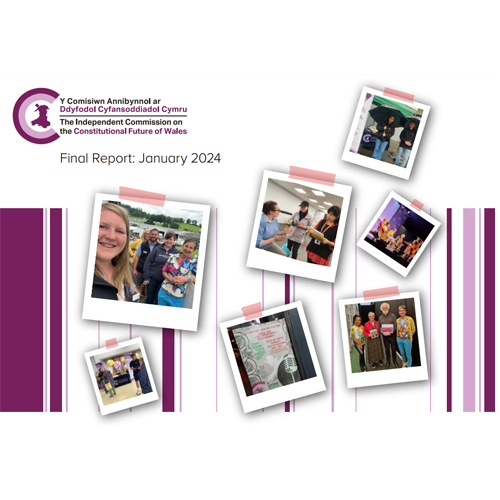The first in a series of reflections on the Commission's report
In January, the Independent Commission on the Constitutional Future of Wales published its final report, eagerly anticipated and only fractionally overdue. As with previous Commissions of Inquiry – Richard, Holtham, the Silks and Thomas – its findings will undoubtedly hold sway over ongoing debates over the future of Welsh devolution.
This first post in a series of reflections on the Commission’s report, hosted by the Centre for Governance and Human Rights at Swansea University, will serve as an introduction. In it, I’ll outline the remit and recommendations of the Commission’s report, before making some general observations about its conclusions.
Background
Way back in the Autumn of 2021, the Welsh government established an Independent Commission on the Constitutional Future of Wales, to be co-chaired by former Archbishop of Canterbury Dr Rowan Williams and Professor Laura McAllister, who, together with nine members drawn from a range of professional and political backgrounds, were given two objectives:
- “To consider and develop options for fundamental reform of the constitutional structures of the United Kingdom, in which Wales remains an integral part.
- To consider and develop all progressive principal options to strengthen Welsh democracy and deliver improvements for the people of Wales.”
Mick Antoniw MS, Counsel General and Minister for the Constitution, aptly described these objectives as ‘broad’ when he announced the Commission. Indeed, they are notably broad in at least two significant respects.
First, breadth in territorial scope. The Commission was tasked with considering ‘fundamental reform of the constitutional structures of the United Kingdom’ as a whole – a remit well beyond the Senedd’s legislative control, not least because even the constitutional structure of Wales is in large part outside the remit of Welsh political institutions – contained, as it is, in an Act of the UK Parliament the amendment of which is itself a reserved competence.
Second, breadth in subject matter. In ‘constitutional structure’ and ‘Welsh democracy’, the Commission’s remit arguably encapsulates virtually every aspect of Welsh devolution.
The Final Report
The Commission evidently endorsed this expansive reading of its terms of reference. An extensive breadth of focus permeated the scoping exercise which dominates its Interim report, and is fully reflected in the final report, which discusses and (in some but not all cases) makes recommendations relating to a disparate range of policy issues. In part, that simply reflects the breadth of the terms of reference, but it also derives from the Commission’s observation that the fundamentals of democracy and the constitution are inextricably connected with policy and delivery, especially in the view of citizens, who ‘are more likely to express their aspirations [about governance] through their experiences of public services.’
A blog post cannot hope to fully outline every detail of the Commission’s final report – a sketch of its key themes will have to suffice. To begin with, the report makes recommendations intended to strengthen Welsh democracy, ranging from endorsing reforms to the electoral system and the increase the membership of the Senedd which are already in the legislative pipeline, to recommending an expert panel is established to consider improvements to citizen engagement and civic education.
Next, the Commission endorses reforms to the financing of Welsh devolution, primarily aimed at giving the Welsh government more flexibility in managing its own finances and budgeting for future plans, with more freedom from UK Treasury micro-management. It also joins the persistent clamour for reform to the Barnett formula.
Turning its attention to ‘devolution boundaries’ – the division of competences between Welsh and UK institutions – the Commission makes a number of tentative recommendations across several discrete policy areas, including broadcasting, energy, and rail services (all of which will be subject of further discussion in upcoming posts in this series). Unsurprisingly, it also re-asserts the case for implementing the as yet largely overlooked reforms to justice and policing proposed by the 2019 Thomas Commission.
Not unexpectedly, given the terms of reference, large parts of the report focus on constitutional fundamentals – albeit with heavy emphasis on form and procedure rather than the substance of, for example, constitutional protection of human rights, which will be the focus of an upcoming post in this series. Within this broad category, two distinct approaches are discernible: first, constitutional tinkering; second, radical constitutional change.
As to the former, the Commission suggests several tweaks to the current devolution settlement, including proposals to strengthen and further ‘entrench’ the Sewel convention, and to codify principles of inter-governmental relations between the devolved and UK governments.
As to the latter, the final substantive Chapter of the report discusses three alternative visions of the ‘Constitutional Future’ for Wales – and indeed the UK as a whole: enhanced (or entrenched) devolution, Federalism, and Independence. The ICCFW declines to make any recommendations in this regard, regarding ‘that choice [as one] for citizens and their representatives’, arguably with some justification.
Innovation in Approach, or a Missed Opportunity?
Subsequent posts in this series will consider specific issues and themes raised by the report in greater depth. For now, let’s stick to a couple of very general observations. As we have seen, the Commission was conferred – and embraced – a tremendously broad remit. Such breadth is by no means necessarily a bad thing – different aspects of the devolution settlement are, of course, necessarily interwoven and a broad focus allows for the connections between discrete features of the settlement to be properly considered.
But in this case breadth, combined with an arguably justified deference to more democratic decision-making forums, has produced a report which is both slightly disjointed and notably cautious. As above, much of the report endorses existing recommendations or reforms already in progress. Elsewhere, policy areas including energy and broadcasting are kicked into the long grass with recommendations for the establishment of further expert panels. On fundamental constitutional reform the Commission resiles from making concrete recommendations at all, beyond its proposals for the future of the Sewel Convention.
There is little, then, by way of concrete policy recommendations for proponents of reform to Welsh devolution to rally around. But perhaps that misses the point. Arguably more notable than its specific conclusions was the Commission’s stated aim of provoking and promoting a ‘national conversation’ about the future of Welsh devolution. That aim was reflected in its innovative approach to engagement with as broad a sample of the Welsh public as possible, through a variety of non-standard mechanisms including open-access roadshows, commissioned surveys, and events run in conjunction with community groups.
And arguably this ‘national conversation’ mantra carries over into the Commission’s report, inasmuch as it is content simply to suggest that one ought to take place on a number of key issues – not least the Commission’s titular focus: the ‘Constitutional Future of Wales’. How, exactly, that laudable goal is to be given practical effect is altogether less clear.




